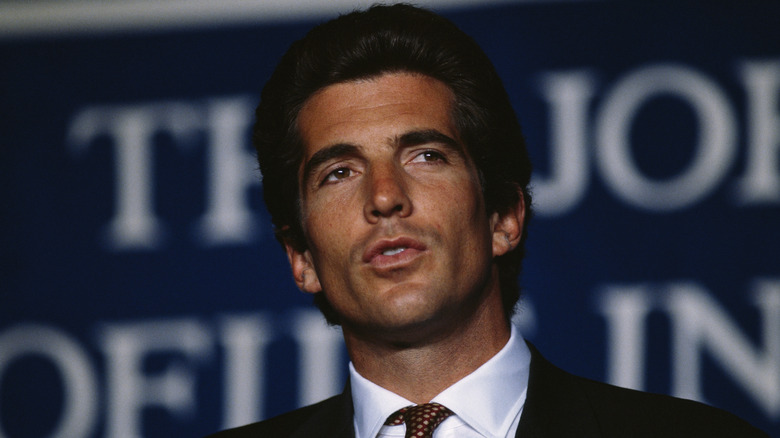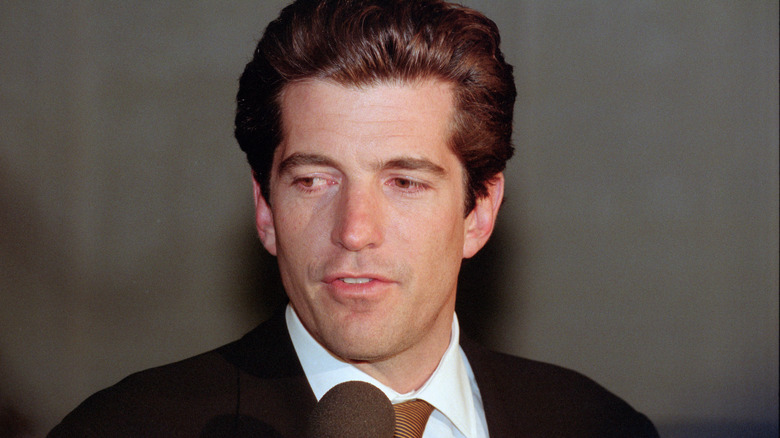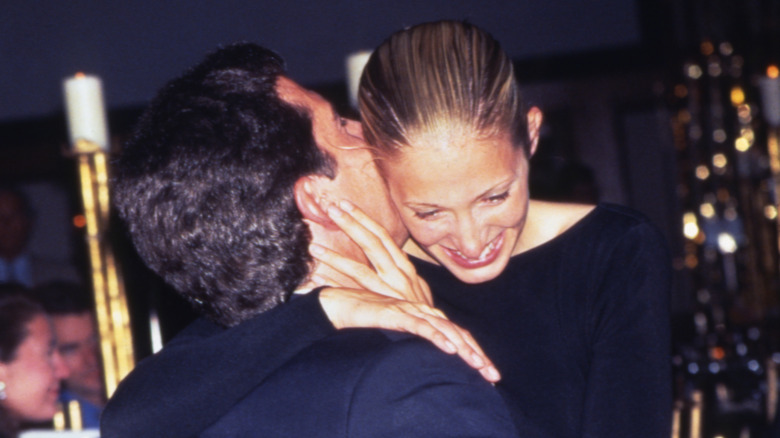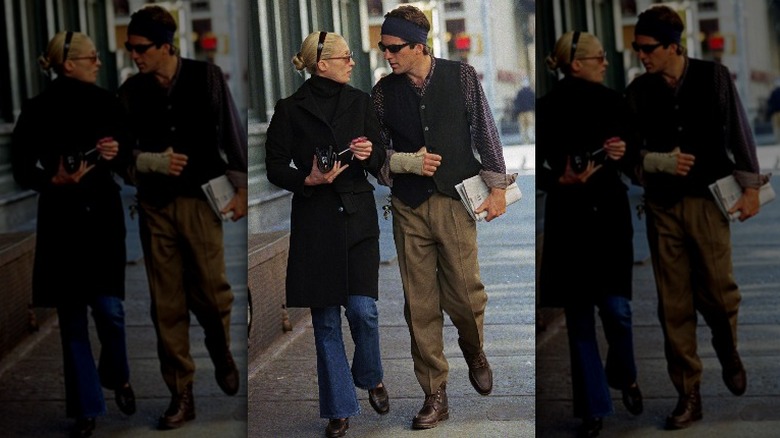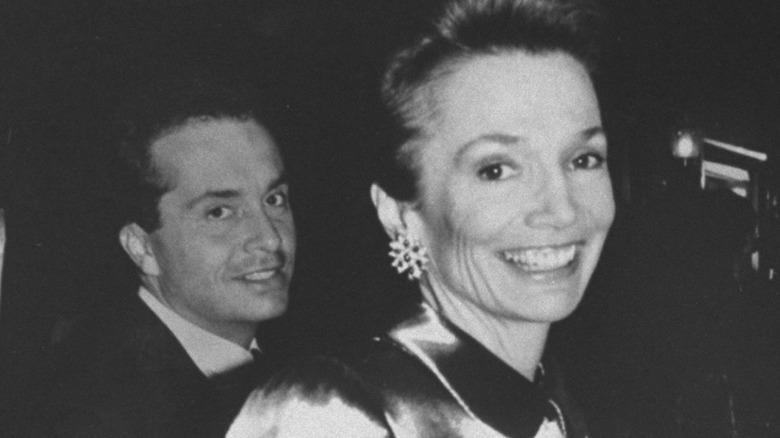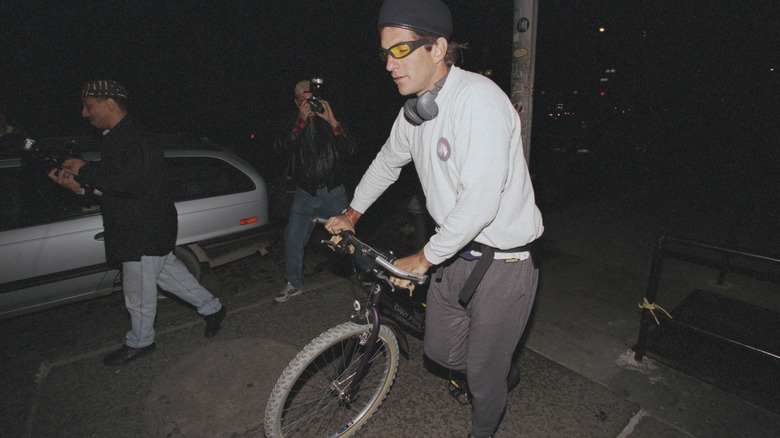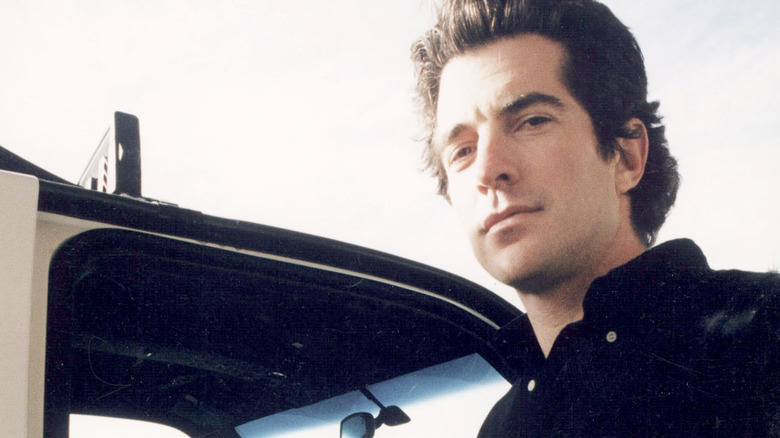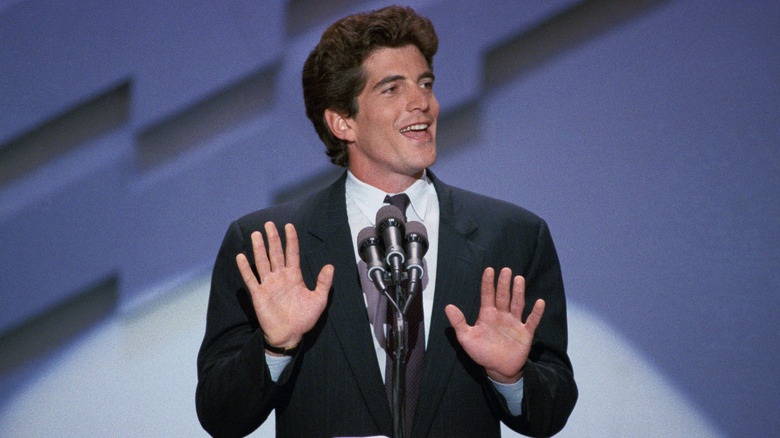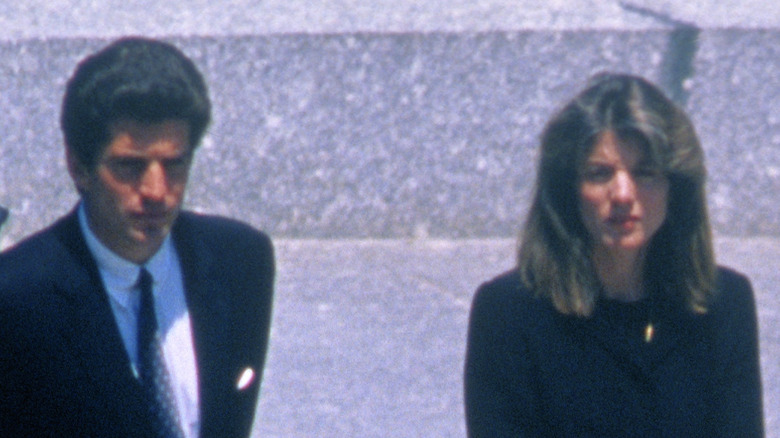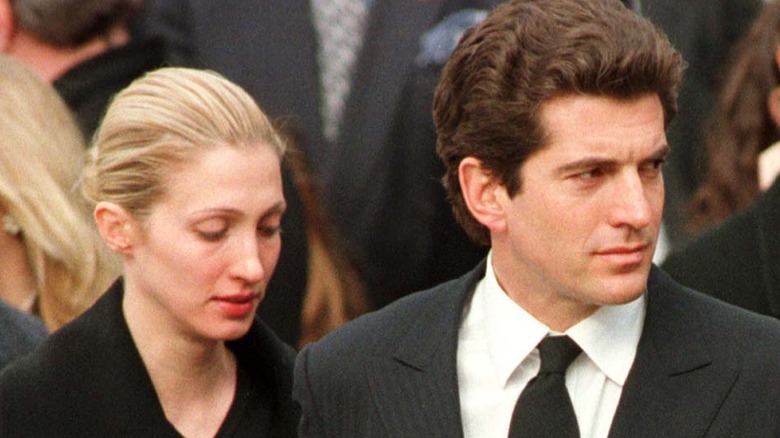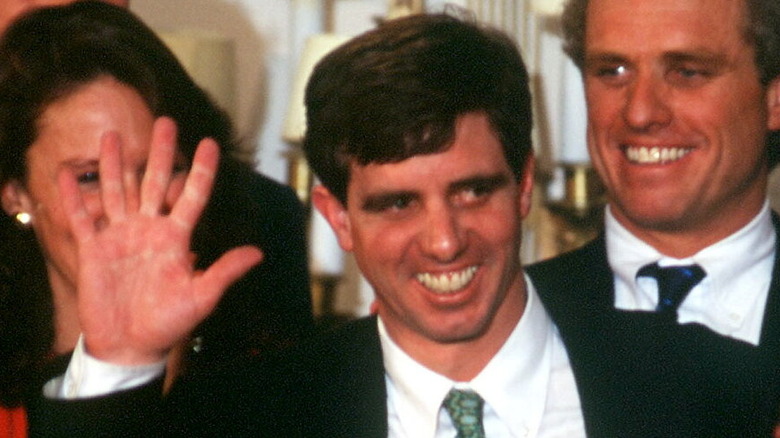The Final Months Of John F. Kennedy Jr.'s Life
The heir to Camelot never had a time in his life out of the American spotlight. By the time John F. Kennedy Jr. was born on November 25, 1960, his father was already president-elect of the United States, and the press were quick to grant him the diminutive nickname of "John-John" (not a name used within the family). One of the most iconic photographs associated with the Kennedy era was of young Kennedy saluting his father's casket on his third birthday.
After the death of John Sr., Kennedy and his sister Caroline were taken to New York by their mother. Good looks, celebrity love affairs, and a certain amount of personal hunger for publicity — among the career paths he explored was acting — kept Kennedy in journalists' sights. After a successful stint in the New York district attorney's office, he entered the media world himself in 1995 with the launch of his magazine, George. The next year, he tied the knot with publicist Carolyn Bessette.
Kennedy and Bessette's tragic deaths (along with Bessette's sister Lauren) on July 16, 1999, shocked the nation. Only 38 years old, Kennedy's premature end fueled perceptions of his family as a haunted clan dogged by misfortune — a phenomenon known as the "Kennedy curse." His final months, juxtaposed against his death, might only have fed that image more, as Kennedy struggled on personal and professional fronts.
His political magazine was floundering
John F. Kennedy Jr. spent his life in the pages of magazines. He was People's Sexiest Man Alive for 1988. But when Kennedy got into the game himself with George magazine in 1995, it wasn't as a model or a subject, but as an editor. George was a glossy magazine dedicated to marrying political and celebrity coverage, "a magazine about politics for people who think they don't like politics." Kennedy suggested in the inaugural issue that George was part of a shift in the way politicians spoke to voters. Some critics, including a particularly acidic assessment of George in Spy magazine, suggested the whole enterprise was designed to make Kennedy look smart and shut up those members of the press who looked down on him.
Kennedy partnered with friend Michael Berman on George and relied on the French firm Hachette Fillipachi for a publisher. According to anonymous staffers interviewed by Spy, morale was initially high and Kennedy was well-thought of by his team. When it finally debuted, George reached a circulation number north of 400,000. But its early success wasn't maintained. Critics pounced, sharing rumors of incompetence and tensions between Kennedy and Berman.
In the last months of Kennedy's life, George was projected to lose $10 million for the year, according to Edward Klein's 2003 book "The Kennedy Curse: Why Tragedy Has Haunted America's First Family for 150 Years." Determined to keep it afloat, Kennedy sought to move the magazine to a new publisher. He began initial talks with Condé Nast president Steve Florio to possibly take George there before his death.
His marriage suffered from his work and fame
Elaine Benes may have missed her chance with John F. Kennedy Jr. in "Seinfeld," but the real-life Kennedy had several high-profile relationships before settling down. Girlfriends, or purported girlfriends, included Madonna and Sarah Jessica Parker. In September 1996, Kennedy married fashion publicist Carolyn Bessette, whom he had been involved with for some time. The photogenic couple were a strong draw for the media. But despite her background in publicity, Bessette came into her marriage unprepared for the degree of scrutiny the Kennedy family was subject to.
According to Edward Klein's "The Kennedy Curse," press intrusion onto Kennedy and Bessette's marriage began almost the moment they came back from their honeymoon, despite Kennedy's pleas to respect his new wife's privacy. His reaction to the press, however, was very different from Bessette's; Klein suggests that Kennedy loved the attention, while Bessette increasingly sought ways to run from it. Former assistant to Jackie Kennedy Kathy McKeon claimed in her book "Jackie's Girl" that Bessette wanted to lash out at the paparazzi.
In their final months, Kennedy's magazine George was purportedly exacerbating tensions between the couple. Bessette resented the demands the magazine put on her husband's time, and the attention he paid his business partner Michael Berman. The hectic and heavily scrutinized nature of their lives also put her off having children — another point of conflict with Kennedy.
Were he and Carolyn Bessette headed for divorce?
Tensions were mounting in the final months of John F. Kennedy Jr. and Carolyn Bessette's marriage, though just how tense is unclear. Edward Klein painted a grim picture in "The Kennedy Curse." Citing an anonymous friend, Klein wrote that Kennedy and Bessette were barely on speaking terms, and that Kennedy was talking divorce just two days before his plane crash. Bessette was alleged to be terrified at the thought of losing Kennedy, having been through divorce as a child, but was also controlling and antagonistic toward anyone else who commanded her husband's attention, even his sister. Other nameless sources suggested that Bessette used cocaine and got physically violent with Kennedy. He, claimed Klein, was at a loss to explain the marriage's collapse, but never reckoned with the Oedipal nature of his attraction to Bessette in the first place.
This portrait of the couple's married life in their last days has been disputed by other friends, ones who were willing to go on the record. Ariel Paredas, the granddaughter of an assistant to Jackie Kennedy, conceded to People that Kennedy and Bessette often argued, but maintained that they were a loving couple. John Perry Barlow, a friend of Kennedy's, disputed the unflattering media portrayal of Bessette. And one of Kennedy's friends (who did elect to stay anonymous) insisted that any tensions between the pair at the time of their deaths would have passed over.
His best friend and cousin was dying
The Kennedys are sometimes referred to as American royalty, but Anthony Radziwill, John F. Kennedy's cousin and best friend, was literally the son of a prince. Tied to Kennedy through their mothers, who were sisters with a famously troubled relationship, Radziwill made his living in media, working his way from an associate sports producer with NBC in 1988 to an Emmy award-winning news producer with ABC by 1990, with his work well-regarded by journalists like Diane Sawyer. He and Kennedy were each other's best men at their respective weddings.
But in 1994, Radziwill was diagnosed with testicular cancer. The illness did not immediately impede his life. That same year, he married his wife Carole, and in 1997, he became an executive at HBO. A third Emmy and a fourth nomination came his way. In the meantime, Radziwill tried all available treatments for his condition. But his health continued to deteriorate.
By 1999, the 40-year-old Radziwill, his wife, and his cousin Kennedy knew that he wasn't going to make it. "We knew that it was likely Anthony would not survive to see Labor Day," Carole told Town & Country Magazine. So sure was Radziwill's impending death that Kennedy was working on a eulogy for him right before his own death. Kennedy's wife, Carolyn Bessette, was also close to the Radziwills and did her best to see to their needs. Anthony Radziwill died on August 10, 1999, just under a month after his cousin.
John F. Kennedy Jr. was recovering from a broken ankle
Besides his name and good looks, John F. Kennedy Jr.'s public persona was defined by his love of adventure. He liked to bike, rollerblade, scuba dive, kayak, drive a powered parachute, glide, and fly. Friends and instructors remembered him as loving the freedom of such endeavors while still taking care in pursuing them. But an accident from one of his adventures has become tied in with theories about his tragic death.
Six weeks prior to his last flight, Kennedy was hang gliding when he broke his ankle. He was put in a cast and had to get around on crutches. He still wasn't fully healed when he had his cast removed on July 15, 1999. But Kennedy was delighted. He told his friends that he was most happy because having the cast off meant he could fly planes on his own. It was an enthusiasm not shared by his friends or doctors, who all counseled Kennedy to wait until he was more fully healed.
Some of that worry came from Kennedy's inexperience as a pilot. While he was licensed to fly by 1999, he was still unskilled in monitoring instruments , according to the podcast "Fatal Voyage: The Death of JFK Jr." On top of that, he would need to foot-operate his plane's pedals. It's been speculated that Kennedy's injury and inexperience both contributed to his fatal plane crash, though a fellow pilot disputed that theory based on Kennedy's movement before the flight.
He had only just gotten his pilot's license
At the time of his last flight, John F. Kennedy Jr. was a licensed private pilot. But he had only held that license since April of the previous year, and his credentials were not complete in July 1999. He was not yet qualified to fly solely by instruments. According to historian John Hankey on the podcast "Fatal Voyage: The Death of JFK Jr.," Kennedy was in the process of getting an instrument rating before his death, having passed the relevant exams. But air crash investigator Richard Bender told "Fatal Voyage" that Kennedy still wasn't solid enough on the instruments to always know which one to look at. And his logged flight hours in his private Piper Saratoga II HP — 37 — weren't enough to qualify for personal liability insurance, a fact Kennedy kept even from his own wife, according to Edward Klein's "The Kennedy Curse."
Kennedy wasn't intimidated by his limited experience. Editor Barry Levine told "Fatal Voyage" that flying was Kennedy's great passion and release from cares. He got into flying every weekend with his dog Friday, and he enjoyed flying his planes without a co-pilot. Kennedy was quick to tell friends after getting an ankle cast off on July 15 that he could now fly solo; a delay of just a few days might have ensured that he enlisted a co-pilot for the trip up to Martha's Vineyard. Some think that Kennedy, underqualified in reading instruments, wasn't capable of landing his plane safely when it ran into haze.
Was he planning to run for office?
The Kennedy name is inextricably linked to politics in American life, but John F. Kennedy Jr. did not go into the family business. He tried acting, then law, then magazine editing. In the final months of his life, however, the political itch seemed to have reached him, though whether and how he would scratch it was still up in the air.
According to biographer Steven M. Gillon (via Town & Country Magazine), Kennedy was keen to find his own identity and felt no compulsion to become a politician. But he began exploring a run for the U.S. Senate in March 1999. New York was about to have an open seat. But the precarious state of George magazine, the poor health of his cousin Anthony Radziwill, and tensions within the family all discouraged him. And though his father and uncles had served in the Senate, Kennedy was not attracted to the legislative branch, said Gillon. He was interested in perhaps running for New York governor down the road.
And after that, perhaps 1600 Pennsylvania Avenue. Gillon has claimed that Kennedy, upon seeing George H. W. Bush's inauguration with an unnamed friend, talked about going "home," as in, the White House. If a presidential run wasn't immediately in the cards, it might have factored into Kennedy's long-term planning.
He and his sister weren't on speaking terms
While John F. Kennedy Jr. was regularly in the spotlight, his older sister Caroline was a much quieter presence in American life. Never one to court the press or attract them in the way her father, mother, and brother did, Caroline worked with the American Ballet Theater and the Metropolitan Museum of Art and eschewed politics, at least publicly. Her social circle included the Clintons and Hollywood stars. And she was, for a time, close to her brother.
Edward Klein speculated in "The Kennedy Curse" that John Jr. took after the Bouvier family more in looks but the Kennedys in temperament, outgoing and daring, while the reverse was true with Caroline. As they entered adulthood, tension started to develop between these siblings of such different attitudes. Caroline reportedly didn't think much of George magazine, which John Jr. took as writing off his abilities. And neither of them liked the other's spouse. According to Steven M. Gillon's biography "America's Reluctant Prince," Caroline's husband, Ed Schlossberg, inserted himself into Kennedy family decisions in a way that irked John Jr. Caroline allegedly got off on the wrong foot with John Jr.'s wife, Carolyn Bessette, on their wedding day. In their final months, John Jr. and Bessette barely spoke with Caroline.
Such family tension was hard, and John Jr. and Caroline had tentatively begun to mend fences. But both counted on having more time to do so.
He and Carolyn were meant to attend a Kennedy wedding
John F. Kennedy Jr.'s last flight on July 16, 1999, was meant to be to a family function. His cousin Rory was getting married, and John Jr. had promised her he would be there. He would be the sole representative from his side of the family; his sister wasn't attending. There was a question in the days immediately before the flight whether John Jr.'s wife, Carolyn Bessette, would attend as well. Husband and wife were alleged not to be on speaking terms, and according to Edward Klein's "The Kennedy Curse," Carolyn was also reluctant to go anywhere near John Jr.'s flying hobby.
Klein wrote that Carolyn's sister Lauren managed to mediate the couple's problems, at least temporarily, the night before John Jr.'s flight. She persuaded her sister to join her husband at the wedding and joined the flight party herself, at least for part of it. The plan was for Lauren to get dropped off at Martha's Vineyard. John Jr. and Carolyn would then fly to Hyannis Port, to the Kennedy compound, for the wedding.
The flight was late in getting off the ground, and hit the skies despite the fact that other flights out of New Jersey that night had been called off on account of poor visibility. John Jr.'s plane never arrived in Martha's Vineyard, where longtime friend Dan Samson was waiting to pick up Lauren.
There had been a death in the family already
The death of John F. Kennedy Jr. came on the heels of a series of misfortunes for the family, some of them John Jr. himself felt compelled to answer for. He had used his editorial in George magazine to denounce the behavior of his cousins, Michael Kennedy and U.S. Representative Joseph Kennedy. The older Joseph sought to annul his marriage to Sheila Rauch in 1996, despite having divorced her five years earlier. The Episcopalian Rauch responded by appealing the annulment and launching a public assault on the concept. The following year, Michael Kennedy was found to have carried on an affair with his underaged babysitter, a revelation that helped sink his brother's gubernatorial campaign.
"Two members of my family chased an idealized alternative to their life," John Jr. wrote in George (via The Washington Post). "Both became poster boys for bad behavior." He went as far as to call Michael's scandal a "hedge against morality" and suggested the fierce condemnation he and Joseph received was deserved. But he also admitted to his own temptations and asked, apparently in regards to Joseph, "Since when does someone need to apologize on television for getting divorced?"
The latest Kennedy tragedy before John Jr.'s death was Michael's untimely end in a skiing accident on New Years Eve 1997. John Jr. attended and participated in the service and was seen embracing his surviving cousin.
